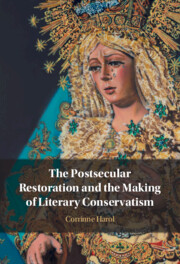Book contents
- The Postsecular Restoration and the Making of Literary Conservatism
- The Postsecular Restoration and the Making of Literary Conservatism
- Copyright page
- Contents
- Acknowledgments
- Introduction
- Part I Political and Fictional Relations
- Part II Postsecular Literary Experiences
- Chapter 3 Figuring
- Chapter 4 Reading
- Part III Political Agents and Novel Forms
- Bibliography
- Index
Chapter 4 - Reading
John Dryden’s Postsecular Apostolic and the Time of Literary History
from Part II - Postsecular Literary Experiences
Published online by Cambridge University Press: 22 June 2023
- The Postsecular Restoration and the Making of Literary Conservatism
- The Postsecular Restoration and the Making of Literary Conservatism
- Copyright page
- Contents
- Acknowledgments
- Introduction
- Part I Political and Fictional Relations
- Part II Postsecular Literary Experiences
- Chapter 3 Figuring
- Chapter 4 Reading
- Part III Political Agents and Novel Forms
- Bibliography
- Index
Summary
“Reading: John Dryden’s Postsecular Apostolic and the Time of Literary History” analyzes John Dryden’s writings of the 1680s, tracking his move (his literary conversion if you will) from allegory and allegoresis to new concepts of literary history and literary hermeneutics that demand new reading practices. It analyzes Dryden’s mid-career allegories as investigations into how conservative theories of temporality, figured here as the possibility of understanding across time, produce theories of literature and theories of reading that are oriented toward the future but that are necessarily grounded in the past and in material bodies. This chapter argues that Dryden’s writings from the 1680s secularize a ritualized, affective, transformative, and Catholic reading practice. It speculates that a literary conservatism – literary temporality as communion and literary interpretation as committed to a hermeneutics of immanence – constitutes a conservatively based idea of reading that resonates once again in the twenty-first century critical turn to post-critical and post-nationalistic methods.
- Type
- Chapter
- Information
- Publisher: Cambridge University PressPrint publication year: 2022

